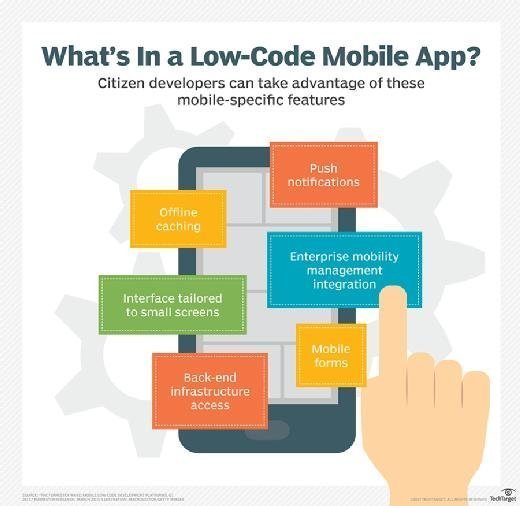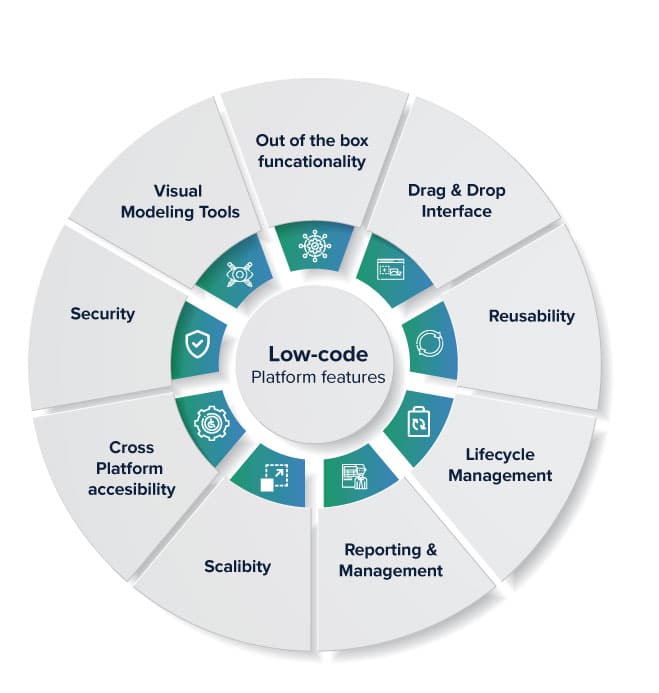Handy Info For Deciding On Low-Code Platform Info
Handy Info For Deciding On Low-Code Platform Info
Blog Article
Development Of Low-Code Apps Is Quicker.
Visual Development Environment (VDE):
Drag-and-Drop Interfaces: Low-code platforms provide visual tools for designing applications. Drag-and-drop components are a great tool for developers to create apps without extensive code.
Templates and components that are pre-built: Many low code platforms have pre-built components and templates, which allows developers to quickly prototype and create applications.
Coding requirements that are less invasive:
Automated Code Generating: Low-code platform generates the code beneath based on the visual models that developers design. This eliminates manual coding and speeds the process of development.
Reusable component: Developers are able to use the same components for different projects. This cuts down time spent on writing code and testing.
Streamlined Collaboration:
Low-code platform tools often contain versions control, testing deployment. This enables the seamless communication between teams.
Citizen Development: Non-developers as well as business users can benefit from simple interfaces to help in the creation of applications, which helps reduce bottlenecks triggered by a lack of available professionals to develop applications.
Rapid Iteration & Prototyping
Rapid Prototyping Developers are able to quickly develop prototypes to allow ideas to be validated and feedback to be gathered which results in faster iteration.
Easy Modifications. The visual interface that low-code development provides makes it easy to update and change applications. This accelerates the process of improving and refining the application by incorporating user feedback.
Pre-built Integrations:
API Integrations: Low-code platforms typically come with connectors for popular APIs and services. This can reduce the time needed to integrate other systems.
Data Integration: Built in tools to integrate data simplify the connection to databases and data sources. This helps speed up development.
Deployment Scaling
One-Click deployment: A lot of platforms that make use of low-code have a one-click option for deploying applications, reducing the amount of time and effort.
Cloud-Based Solutions: Cloud-based low-code platforms are able to manage scaling and infrastructure management, allowing developers to focus on the application's logic and function rather than deployment logistics.
The speed of low-code app development is in its ability to simplify and automate various aspects of the development. This allows quicker delivery of applications as well as quicker adaptation to changing requirements. Read the top rated Low-code Platform for application development for site advice including build with docker, jdbc server, cross platform app development, mobile app development platforms, rapid action development, developing mobile apps, application modernization, cloud software applications, rad application development, app development platform and more.
Benefits Low-Code Apps In Safety And Governance
Low-code application development offers several advantages in terms of security and governance. These is essential to ensure that applications are compliant, secure, and well-managed throughout their lifespan. Below are the advantages of developing low-code applications:
Unified management console: Low code platforms typically have a central administration console where administrators can manage all applications and ensure that there is a consistent management within the organization.
Role-Based Access Control RBAC: These platforms have robust role-based controls that allow administrators to set access rules. This ensures that only those who have authorization are able to alter or gain access to specific areas of the application.
The Compliance Process and Regulatory Adherence:
Many low-code platforms include integrated compliance features. They are designed in accordance with the standards of the industry regulations, laws and standards (e.g. HIPAA, GDPR). These platforms offer frameworks and tools to make sure that the applications are compliant with these requirements.
Audit Trails & Logging: Comprehensive logs and audit trails can be integrated to allow companies to monitor changes, monitor access and ensure the compliance.
Improve Security Measures
Data encryption: Low-code platforms often offer built-in data encryption both in transit and at rest. This guarantees that data sensitive information is secured.
Security Certificates: A lot of low-code companies have a security certificate (e.g. ISO 27001 and SOC 2) which demonstrate that they are adhering to strict security guidelines. They offer an additional security level to their customers.
Automated Security Updates
Regularly scheduled updates and patches Low-code platforms generally handle patches and updates to security automatically, ensuring that applications are secure from latest threats without manual intervention from developers.
Security Monitoring: Continuous security monitoring tools are used to send real-time notifications and information on security concerns.
Data Governance
Data Access Policies These systems allow companies to establish data access policies and then enforce them, ensuring data is available only to authorized users. They also make sure that the data is being used in a safe manner.
Data Masking and anonymization The built-in tools that hide and anonymize data helps secure sensitive information in testing and development environments.
Consistent Application Management
Pipelines for development and delivery: Low-code platforms often have integrated development pipelines as well as delivery pipelines that include security tests. Security is guaranteed throughout the entire lifecycle.
Version Control - Integrated version controls help keep track of modifications to applications, and permits users to revert them in the event of need. They also maintain the integrity and integrity of the application.
Authorization, User Authentication and Authorization
Single Sign-On (SSO). Support for advanced authentication and single sign-on is simple and improves security.
Multi-Factor Authentication (MFA) A number of platforms have built-in support for multi-factor authentication. It adds an additional layer of security to access applications.
Monitoring of Policy Enforcement and Compliance:
Low-code platforms include templates for policies predefined and can assist organizations in the implementation of governance policies and security policies.
Compliance Monitoring Tools - These instruments provide constant checking of compliance status and offer reporting, making it easy to identify and resolve potential issues.
Integration into Existing Security Infrastructure:
Seamless Integration: Low-code platforms are designed to work seamlessly with existing security infrastructure and tools, including identity management solutions, SIEMs (Security Information and Event Management Solutions), and firewalls.
API Security API Security features allow integration with other systems, protecting information and ensuring integrity of the applications.
Training and the best practices
Many platforms offer guides and best practices to secure development of applications. They assist non-developers to meet security standards.
Security Training: Certain providers of low-code software offer education and resources in security to help users learn how to design and develop secure applications.
Overall, the application's governance and security advantages ensure that applications will be developed and maintained in a secure manner, in compliance with regulations and in control. These platforms have the necessary frameworks and tools to protect sensitive information and enforce policies, as well as maintain regulatory compliance, while facilitating management and oversight. View the recommended Enterprise application development with Low-code Platform recommendations for website tips including app dev platform, cross platform mobile dev, software for app development, database in azure, cross platform app dev, push notifications android, develop cross platform mobile app, rapid application design, build a docker container, rapid applications and more.
In Terms Of Support For Vendors And Community, Low-Code Applications Development Can Bring Many Advantages.
Low-code development platforms have significant advantages when it comes to support for vendors as well as the community. These are crucial for successful implementations, ongoing maintenance, as well as constant improvement. Here are some key advantages.
Comprehensive Technical Support:
Support Teams Dedicated to You: A lot of low-code platforms have access to support teams that can help with technical issues, troubleshooting, and provide guidance to ensure that any problems are resolved promptly.
Support is available 24/7. Numerous vendors offer round-the-clock support that can be especially useful for businesses that operate in different time zones.
Training and Onboarding
Vendors typically offer structured programs for users including tutorials or webinars. They might also offer certification courses.
Personalized Onboarding Many vendors provide personalized services to help their new clients implement the platform efficiently and adapt it to their needs.
Regular updates and enhancements
Continuous Improvement: Lowcode platform vendors usually regularly release updates that contain new features, improvements to performance and security patches. This helps to ensure that the platform is current and safe.
Feedback integration: Vendors will frequently incorporate feedback from users during their development cycle to make sure the platform meets the evolving needs of the users.
Comprehensive Documentation:
The Documentation In Detail: Users can find answers to their questions by referring to an organized and detailed guide that covers every aspect of the software beginning with its fundamental functionality to more advanced customization.
API References: Detailed API documentation helps developers integrate the low-code platform with other systems and tailor their applications efficiently.
Consultation and Professional Services:
Expert Consulting: Vendors typically offer consulting services to assist in the process of strategic planning architectural design, as well as complicated implementations, to ensure that users can leverage the platform to its fullest potential.
Custom Development Services A few vendors offer customized development services to create specific features and integrations which aren't available in the standard.
Community Support
Active User Community:
Forums and Discussion Boards A lot of low-code platforms offer vibrant online communities that allow users to discuss issues, ask questions, and share solutions, and collaborate on best practices.
Local and virtual User Groups These groups offer opportunities to network, learn and share your experiences.
Collaboration and Knowledge Sharing
Community-Contributed Resources: Users often share templates, modules, and extensions that they have developed, which can be reused or adapted by others, accelerating development and innovation.
Crowdsourced Problem Solving: The collective expertise and experiences of the community can be an invaluable source of troubleshooting and finding creative solutions to difficult problems.
Learning and development:
Community-Led Learning: Many communities host workshops, training sessions, and webinars, which are usually run by experienced users who are able to provide insight and more advanced methods.
Tutorials and online courses: Community members often create and distribute online courses, tutorials, and how-to guide, improving the education resources available to all users.
Feedback and Influence
Product Feedback Channels. Community forums usually include channels that allow you to provide feedback to the manufacturer. This feedback may influence the design and development of features.
Beta Testing Programs. Active community members can take part in beta-testing programs. They will be given early access to the latest features of the platform, and also an the chance to influence the future of the platform.
Recognition and Support:
Community Recognition Programs: A lot of vendors have recognition programs to honor the efforts of active community members, such as MVP (Most Valuable Professional) programs.
Peer Support. Community members offer peer-to-peer support. They share their knowledge with new users and offer guidance. This creates an atmosphere that is supportive and collaborative.
Overall, the combination of a robust vendor's support and a vibrant, active community provide a comprehensive support system for low-code app development. Users will be able to gain access to the experts, resources and collaboration opportunities they require to develop applications, deploy, keep them up to date, and enhance their applications.